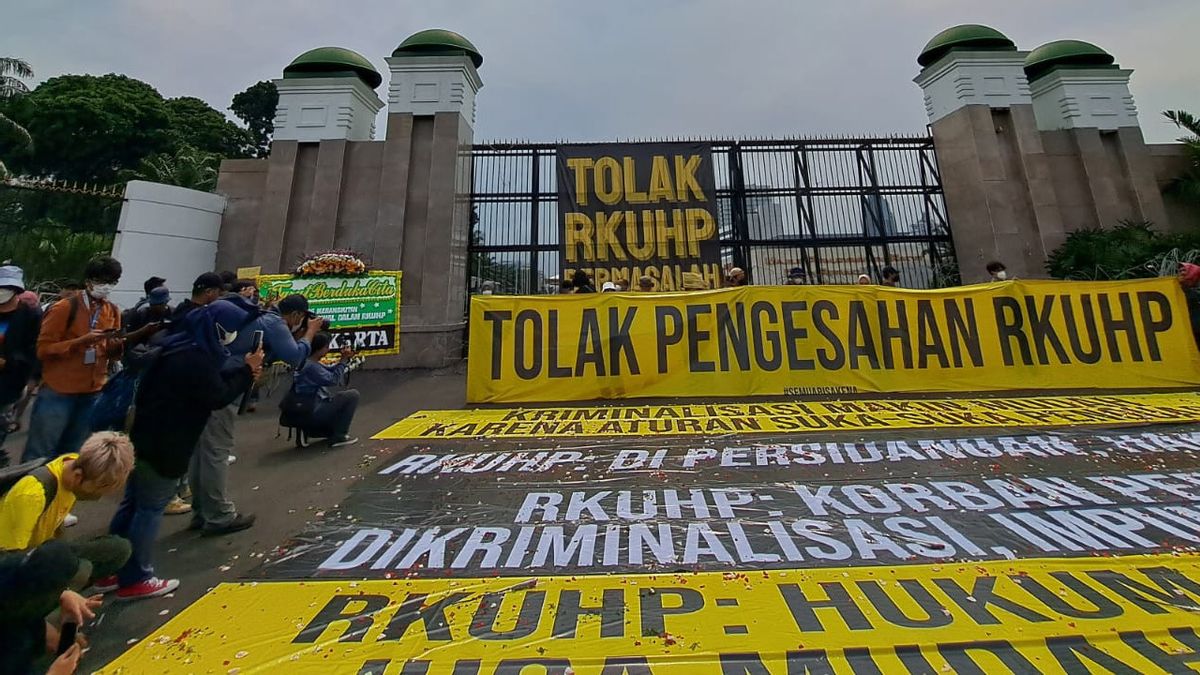JAKARTA - Waves of rejection of problematic articles in the Draft Law (RUU) of the Criminal Code (KUHP) have been started since 2019. A number of elements of society ranging from students to academics continue to voice that these articles be removed or replaced.
This year is no different, the call for rejection is still loud. Apparently, the House of Representatives (DPR) seemed to be "turning their ears" and still ratified the Criminal Code Bill into the Criminal Code Law on December 6, 2022.
Chairman of Commission III of the Indonesian House of Representatives Bambang Wuryanto claims that the discussion on the draft of the Criminal Code has been quite comprehensive and in-depth. Various efforts to explore all the aspirations of the community, such as directed discussions, socialization, and material enrichment have been carried out.
The Criminal Code Law is in principle an effort to 'Open Recodification' against all criminal provisions in Indonesia and to answer all developments in today's society.
"That way, the Criminal Code Law does not completely reduce the applicability of laws outside the Criminal Code (lex specialis), as long as the principles and principles of its imposition follow the Criminal Code (lex generali) Law," said the man who is familiarly called Bambang Pacul during a press conference after the 11th DPR RI Plenary Meeting on December 6, 2022.
The Criminal Code is a step to modernize the National Criminal Law according to the development of the community with the aim of, among others, to ensure legal certainty, create benefits and justice, create criminal proceedings that do not suffer and degrade human dignity.
There are a number of articles that are often debated. Such as articles regarding attacks on honor or dignity of the President and Vice President.
Article 218 paragraph (1) states, "Everyone who publicly attacks the honor or dignity of the President or Vice President shall be sentenced to a maximum imprisonment of 3 (three) years and 6 (six) months or a maximum fine of category IV".
Paragraph (2), Does not constitute an attack on honor or dignity as referred to in paragraph (1) if the act is carried out for the public interest or self-defense.
Likewise the article on extortion against the government. Article 240 states, Every person who publicly insults a legitimate government which results in riots in society being sentenced to a maximum imprisonment of 3 (three) years or a maximum fine of category IV.
Related to that, according to Deputy Minister of Law and Human Rights (Wamenkumham) Edward Omar Sharif Hiariej, insults to the government in this article are limited to the presidential institution, while insults to state institutions are only limited to legislative institutions, namely the DPR, MPR, and DPD, as well as judicial institutions, namely the Constitutional Court and the Supreme Court.
"Both in the explanation of articles related to the submission of the dignity of the President, as well as insults to the government and state institutions, we provide the strictest possible explanation that distinguishes between insults and criticisms," said the man who is familiarly called Eddy after a limited meeting at the Presidential Office, Jakarta on November 28.
However, according to a criminal law expert from Trisakti University, Abdul Fickar Hadjar, the article is excessive. However, the president, vice president, DPR officials, MPR, and DPD are figures chosen by the people through elections.
"So, if you accept criticism, opinions, and even insults are a consequence of your position," Fickar told VOI, Tuesday (6/12).
The National Alliance of Criminal Code Reform in its presentation also considered the article to be very contrary to the rights of everyone in expressing their opinions and expressions.
"Every criticism directed at the president as a government is very likely to be convicted under the pretext of attacking the dignity of the President or Vice President who is often subjective. This article is dangerous because it has the potential to silence critical voices against the government," wrote the National Alliance for Criminal Code Reform.
In Indonesia, the president not only serves as head of state but also head of government. The head of state is only a symbol that the head of government is responsible for implementing the implementation of the state, so that when the public criticizes or questions the performance of the government, it becomes a natural thing and must.
According to some, it became unsuitable when this offense of insult was implemented in Indonesia because of the two functions of the president as a state head as well as a head of government.
Likewise, articles related to punishment against protesters. Article 256 states,
Everyone who without prior notice to those authorized to hold parades, demonstrations, or demonstrations on public roads or public places that result in disruption of public interest, causing trouble, or chaos in society shall be punished with imprisonment for a maximum of 6 (six) months or a maximum fine of category II.
"That's against democracy. Because, it should be enough to just punish for the trouble, it is not emphasized to the demonstration that actually becomes the right of democracy. That is, even though the demonstration did not cause trouble, but because without izi, it was still disbanded," explained Fickar.
Also, punishment for cohabitation or sexual intercourse outside of marriage. It must be seen in the context of all Indonesian people, because so many traditional marriages or marriages due to economic factors are not registered will be criminally entangled.
"Because of that, there must be clarity of the notion of adultery that can be punished," added Fickar.
In the draft of the Criminal Code Bill, the article on adultery and kebo gatherings is listed in Articles 411 and 412, namely:
Article 411 paragraph (1) states, "Everyone who has intercourse with a person who is not a husband or his wife is convicted of adultery with a maximum imprisonment of 1 (one) year or a maximum fine of category II."
Meanwhile, Article 412 states, Everyone who lives together as a husband and wife outside of marriage shall be sentenced to a maximum imprisonment of 6 (six) months or a maximum fine of category II.
In both articles, no prosecution is carried out except for complaints from husbands or wives for people bound by marriage; or parents or children for people who are not married.
The amount of the fines referred to in these articles, namely:
The Criminal Code Law comes into effect after three years from the date of promulgation. Bambang Pacul invited people who have not received the contents of the law to file a judicial review lawsuit to the Constitutional Court.
"So if someone feels disturbed, we invite our friends to take legal action and don't need to demonstrate," said Bambang Pacul emphasized.
The English, Chinese, Japanese, Arabic, and French versions are automatically generated by the AI. So there may still be inaccuracies in translating, please always see Indonesian as our main language. (system supported by DigitalSiber.id)








